DEPARTMENT OF CHEMISTRY AND BIOCHEMISTRY NEWSLETTER
An annual newsletter for alumni and friends of the NIU Department of Chemistry and Biochemistry


An annual newsletter for alumni and friends of the NIU Department of Chemistry and Biochemistry


I have been serving as the director of Undergraduate Studies since fall 2017. In this year’s newsletter, we will focus on our undergraduate program. Currently, there are 175 undergraduate chemistry majors at NIU, studying in four emphases (professional chemistry, biochemistry, educator licensure and pre-professional chemistry). There were 25 B.S. graduates in the past year. These numbers are up from the numbers during the COVID-19 pandemic a few years ago.
Undergraduate research continues to be a major priority in our department. Thirty-two students enrolled in CHEM 498/499 this fall and last spring. In addition, several participated in lab work through the Research Rookies NIU program. Top performers were recognized at our annual Department of Chemistry and Biochemistry awards banquet in April.
Generous support from alumni has allowed more students to continue their research in the summer term for 10 weeks. This last summer, Eric Riley, Alan Calderon, Abdul Hussein and Emmanuel Naumann were awarded fellowships from the Zydowsky Research Fund, and Allison Stewart was awarded a fellowship from the Barrett-Swanson Research Fund. Many thanks to the donors who provided the support for our students.
NIU graduates have been successful in earning admission to many top graduate programs. For example, graduates from last year are now attending the University of Arizona, CarnegieMellon University, Florida State University and Purdue University. Many others have chosen to enter the workforce.
As graduate degrees have become more common as an employment prerequisite, our department has just added an accelerated B.S./M.S. program, recently approved by the university. This program enables students who have extensive undergraduate research experience (two years or more) to complete a master’s degree in one additional year.
I hope you enjoy reading about all that is going on in our department. I invite you to reach out if you are interested in working with our students and faculty. If you’re close by, please consider joining us for our annual Chem Club Demo Night on April 18 .
Professor Lee Sunderlin Director of Undergraduate Studies Faculty Chem Club Advisor
By Tom Parisi

In 2018, a $1 million National Science Foundation grant enabled NIU to offer scholarships and mentoring for high-achieving, lowincome students in pursuit of a STEM degree.
This coming year, those efforts are expanding thanks to a $2 million NSF grant, dubbed Scholarships and Enhanced Mentoring to Promote Equity and Excellence in Science, Technology, Engineering and Mathematics.
Leading the effort, as he did with the prior grant, is Ralph Wheeler, a professor in the Department of Chemistry and Biochemistry who was its chair from 2016 to 2023.
The first grant, spanning six years, served 49 students. This one, at minimum, will serve 68 students over a five-year span that started in January. Students to be supported by the effort will come from the College of Liberal Arts and Sciences — mirroring the prior grant’s scope — as well as the College of Engineering and Engineering Technology (CEET).
‘Changing students’ lives’
“I am thrilled,” Wheeler said. “We’re changing the lives of these students. We’ve got students who work full time, they support families, they couldn’t make it without the sort of support we give. They wouldn’t graduate.”
NIU rates among the nation’s leading institutions of higher education for social mobility, according to national rankings from Wall Street Journal/ College Pulse and CollegeNET. Colleges near the top of these rankings take in high proportions of low-income students and excel at improving those students’ graduation rates and their salaries later in life.
Starting in the fall 2025 semester, NIU’s new STEM project will recruit new community college transfer students or rising juniors who are pursuing bachelor’s degrees in biology, chemistry/ biochemistry, computer science, engineering, geosciences, mathematics, physics or statistics. The focus is to help them graduate and embark on technical careers with research, internship and mentoring opportunities along the way.
“I thought it was natural to open it up to the engineering students as well,” Wheeler said. “This now covers essentially all the STEM programs at NIU. I know we have lots of fine students in engineering who would benefit from this program.”
In addition to demonstrated financial need, grant selection of students will be based on a personal statement and two recommendation letters.
Other NIU faculty members working on the initiative are Timothy Hagen, a professor in the Department of Chemistry and Biochemistry; Christine Nguyen, Ph.D., an associate professor in CEET’s industrial and systems engineering department; and Jason Rhode, Ph.D., associate vice provost for Teaching, Learning and Digital Education, and associate professor of instructional technology in the Center for Innovative Teaching and Learning.
Nguyen, whose parents came from Vietnam, is the first member of her family to earn a doctoral degree in the U.S. Her parents worked extra shifts to support her and her two brothers to secure a college education.
“I had student loans and worked 15 to 20 hours a week as a student worker for all four years, including summers, to afford textbooks, a laptop and other course materials,” Nguyen recalled. “Over the years at CEET, I have met many highly talented students that would benefit from a scholarship like this. I’m really excited that this opportunity includes students in CEET.”
The grant entails peer mentoring, near-peer mentoring and professional development activities that focus on career planning, time management, critical thinking, communication and leadership skills.
Near-peer mentoring consists of graduate students each meeting with eight to 10 undergraduates once a week. They partake in relationship-building activities such as bowling, as well as talking with undergrads about navigating the stresses of college and life, Wheeler noted.
External evaluators of the program will be faculty members from the College of Education, Associate Professor Todd Reeves, Ph.D. and Assistant Professor Ximena Burgin, Ed.D. They will survey students in the program, summarize how the experience is going for them and suggest recommendations annually on how to improve the program.
One of every two NIU undergraduates is Pell Grant-eligible. Pell Grants are federal education grants earmarked for students who have exceptional financial need. About half of all Huskies are first-generation college students.
“This grant matters because it addresses NIU’s demographics so well,” Wheeler said. “We are providing not just financial support but helping these students to navigate a university culture that they and their families are not familiar with.”
The previous grant period had numerous success stories, including one student who was NIU’s Student Lincoln Laureate in 2020 and spent a year working at pharmaceutical company AbbVie before enrolling in the University of Chicago’s graduate chemistry program.
“There are so many stories I could share,” Wheeler said, “but this one’s pretty representative: One young lady who was in the program wasn’t sure she would fit in or if she would make it. As time went on and she received support along her journey, she would say, ‘Now I know I’m as good as anybody else. I’m going to go out and change the world.’”
“It has been a fantastic program,” Wheeler added. “Stories like that student’s is the reason we do this. Our students are inspiring their family members and their peers as well.”
Learn more about our BELONG in STEM Scholars Program .
By Jami Kunzer

NIU has been awarded a $380,000 grant from the National Science Foundation (NSF) to advance research that has the potential to revolutionize diagnostics.
Associate Professor
Irina Nesterova aims to create affordable, accurate and easy-to-use diagnostic devices that can be used by individuals at home and in point-of-care environments, such as a patient’s bedside and settings where resources are limited.
“Everyone knows how useful at-home COVID-19 diagnostic tests are,” Professor Nesterova said. “They’re extremely helpful and lifesaving, and the bottom line is we need more devices like this to be able to manage different health-related situations. What a COVID-19 device is doing is telling us whether certain virus-associated molecules are present in a human sample. This is very valuable information, but what is also important is how much of a molecular biomarker is present.”
Nesterova’s research involves the development of advanced diagnostic devices for quantitative analysis of molecular biomarkers. Molecular biomarkers are molecules that are present in the body and indicate an organism’s health state.
Specifically, this funding will enable NIU researchers to create devices that not only detect the presence of molecular biomarkers, but also measure their quantity. The information is invaluable for diagnostic and therapeutic applications.
“Think about the significance of at-home monitoring of glucose level for diabetes management,” Professor Nesterova said. “There are plenty of other situations when accessible quantitative information on biomarkers is crucial. We can think about monitoring the build-up of immune response during vaccine development, evaluating progress in immunotherapeutic treatments and observing changes in antibody levels during infections.”
The device will provide a yes/no result by generating bubbles when a molecular biomarker reaches a certain threshold. This simple readout method, accessible to people of all ages, will require no specialized training or scientific equipment, making it ideal for at-home use and settings, such as underserved and remote communities.
The platform could be adapted to detect biomarkers for a variety of infectious diseases and immune responses, said Professor Victor Ryzhov, Ph.D., chair of the Department of Chemistry and Biochemistry.
“The topic has far-reaching consequences for developing low-cost diagnostics kits for various diseases, especially in poor countries and/or remote areas of the world,” he said.
The research is part of a three-year timeline, during which Nesterova and her team will work toward a market-ready solution. Nesterova’s team, which currently includes six graduate students and six undergraduate students, is excited about the upcoming work, as well as ongoing projects in other areas of molecular diagnostics.
Graduate student Elzbieta Iwaniuk, an international student originally from Poznan, Poland, has been working on the project since its inception four years ago. She plans to graduate with a doctoral degree in chemistry in spring 2025.
Her interests in bioanalytical research in chemistry overlapped with Professor Nesterova’s research.
“We started that specific project from scratch, so to be able to establish the basis of a detection method that we work on now was an amazing opportunity,” Iwaniuk said. “Working with Professor Nesterova allowed me to grow as a research scientist and I am very grateful for that opportunity.” A fifth-year Ph.D. candidate, Iwaniuk recently gave birth to her son, Leonardo.
“It’s been a challenge balancing the demands of the Ph.D. program and becoming a new mother, but I’ve felt incredibly supported by our department and Professor Nesterova through this journey,” she said.
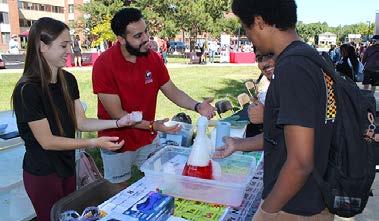
Emily Stewart and Esteban Saenz chat with Jonathan Hernandez and Eli Freites at the Student Involvement Fair in August.
The Chem Club has been very active in recent years, and it has added additional outreach events to its schedule since we returned from the pandemic. Thanks in part to energetic representation at Student Involvement Fairs, the club now has 71 registered members.
Each fall, the Chem Club puts on table demonstrations at STEMFest, which draws around 7,000 people each year to DeKalb. In addition, we have been putting on the closing stage show, ending the event with a boom. Between the tables and the show, over 20 students took part in this event this year. The hands-on experiments draw a big crowd, particularly to the Oobleck (cornstarch and water) trays. Nothing like making a mess to attract young (or not quite so young) chemists.

Calvin Soldan, Bobby King, Emily Stewart, Professor Lee Sunderlin, MJ Harr, Ahmad Ward, Zach Bending, Jonathan Hernandez, Eli Freites, Jeremiah Correnti, Leslie Munoz, Mia Zavala.
The next outreach event on the calendar is Mole Day Oct. 23. This day is celebrated by handing out donuts to students coming to and from class in Faraday and LaTourette Halls. Thanks to Beth Reiter, our stockroom manager, for organizing this event each year.
This year marked the return of the Haunted Labs, previously organized by the physics department. This event used to be held in conjunction with
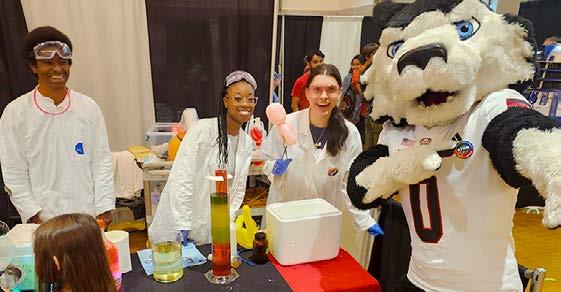
STEMFest, but when STEMFest was moved earlier than October, the Haunted Labs were moved closer to Halloween. The Chem Club now adds to this event, including an encore performance of chemistry demonstrations. Our collection of exploding ping-pong balls is really taking a beating.
In spring 2024, the Chem Club did its traditional Chem Demos Show. This year, the theme was “Mario Brothers.” The hair spray-propelled cannon was brought back into action to launch Mario’s nemesis, Bullet Bill.
The Chem Club does more than demonstrations. Consumption of pizza is another major priority, and any meeting that does not include practice experiments ends in cutthroat card games (Uno is the favorite). Guest speakers and social events like bowling night complete the agenda.
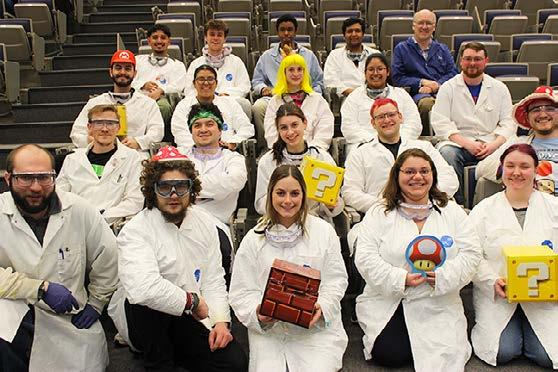
Join us for Chem Demo Night. Friday, April 18, 6 p.m., Faraday Hall 143
*Parking is available in the nearby parking garage.
This summer, the NIU Department of Chemistry and Biochemistry celebrated the achievements of five dedicated research scholars, funded by generous contributions from alumni Thomas Zydowksy and Anne Barrett-Swanson. Abdul Hussain, Alan Calderon, Eric Riley, Allison Stewart and Emanuel Nauman embarked on transformative research experiences under the mentorship of Professors Nesterova, Nesterov, Hagen and Li.
Throughout the summer, these scholars tackled a variety of projects, exploring innovative solutions in chemistry and biochemistry. Their research not only deepened their understanding of complex scientific concepts but also contributed to our department’s ongoing commitment to fostering student engagement in hands-on research.
The support from Zydowksy and BarrettSwanson has been instrumental in making these opportunities possible, enabling students to gain invaluable experience that will benefit their academic and professional journeys. We look forward to seeing the impact of their work as they continue their studies at NIU.


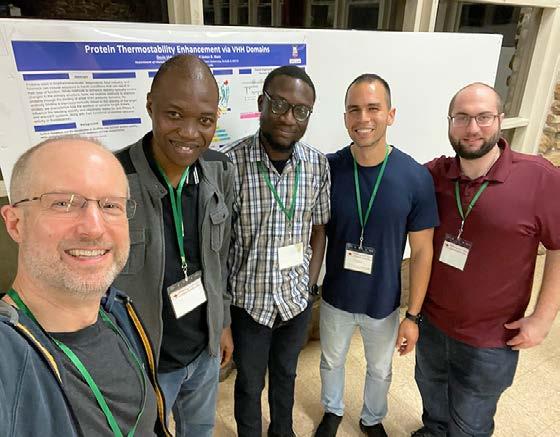
Horn lab member Professor Jim Horn and Ph.D. students Segun Ogundare, Praise Oguntokun, Devin Vides and Jacob Bojan (left to right) at the 2024 38th Gibbs Conference on Biothermodynamics. All presented posters and Oguntokun served as a moderator for a platform session and Ogundare served as a volunteer on the Presentation Logistics Committee. Professor Horn served on the Gibbs Society Board as Past-President.
NIU students and alumni participated in the annual American Society for Mass Spectrometry Conference in Anaheim, California, June 2 to 6, 2024.
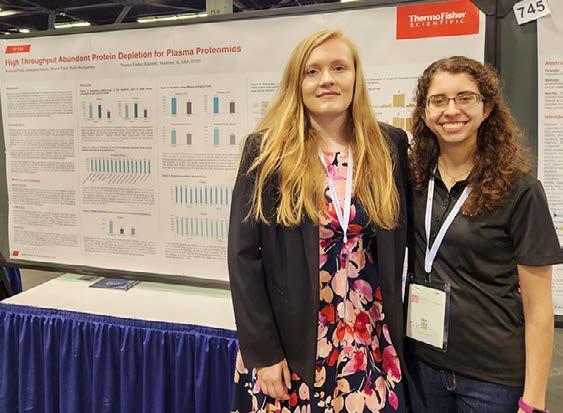
Julia Hoffman (B.S., 2023), now a graduate student at the University of Wisconsin-Madison, and Anastasia Klenke (B.S., 2022), now at ThermoFisher Scientific in Rockford, Illinois.
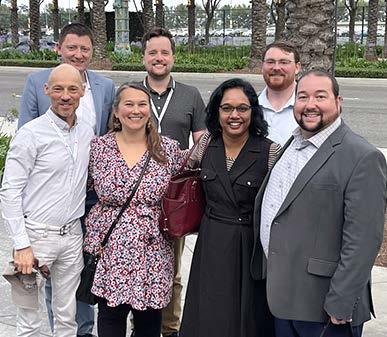
The Ryzhov group alumni dinner at ASMS in Anaheim. From left to right: Victor Ryzhov, Yuriy Pyatkivskyy (Ph.D., 2010, now with Waters), Katrina Emmel (Vaitkunas), (Ph.D., 2007; KemmelCal Inc.), Kevin Parker (Ph.D., 2022; Abbvie), Monorama Tummala (postdoc, 2007-2009; Agilent), Robert King (current graduate student in the group), Michael Zickus (Ph.D., 2010; Sensient Technologies).
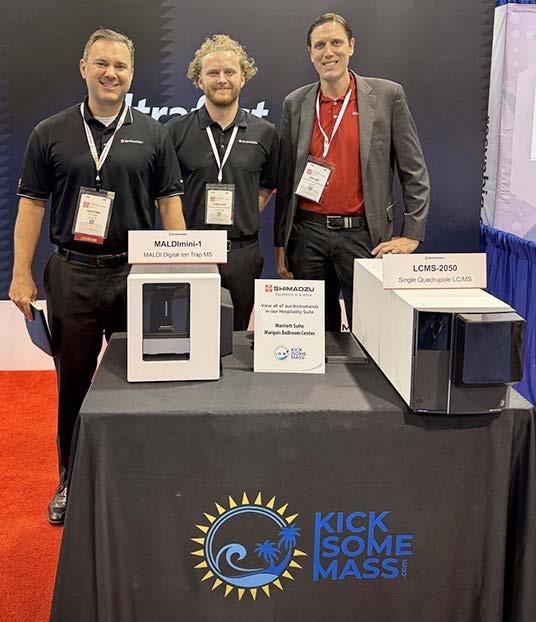
In October, graduate students from Professor Irina Nesterova’s group participated in the Midwest Universities Analytical Chemistry Conference (MUACC) in Wayne State University (Detroit, Michigan). MUACC is a yearly gathering of students and faculty with research interest around the measurement science. The conference that was founded in 1946 brings together faculty and students across Midwest; however, the latest geography extended from Arizona to North Carolina (in trend with the recent Big 10 developments). The meeting comprises chalk talks and poster presentations providing an ideal environment for faculty and students to interact and exchange ideas.
This year, three students, Shaista Ahmad, Niusha Hassandoost and Haniyeh Jadidi, attended the meeting. Professor Nesterova gave a talk on the development of molecular calorimeters while Haniyeh Jadidi and Shaista Ahmad presented posters “Near IR fluorescent sensors for EGFR kinase,” and “Near IR fluorescent assay for kinase inhibitors in cells,” respectively.
All NIU participants enjoyed networking over analytical chemistry research and education-related topics with colleagues and peer graduate students, and look forward to MUACC 2025 which will be hosted by the University of North Carolina.
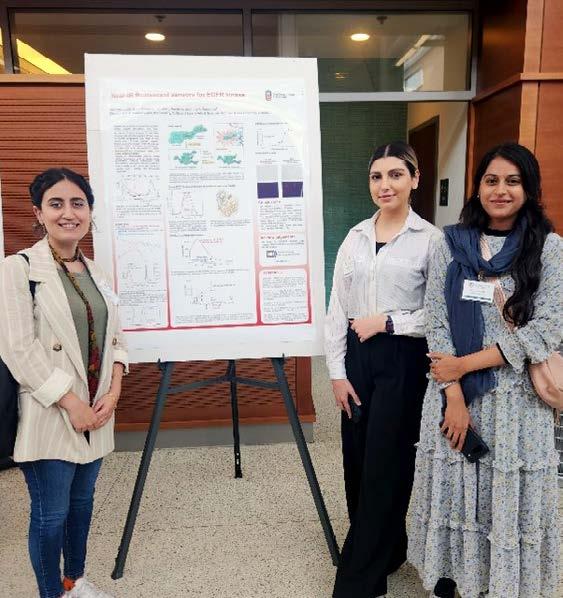
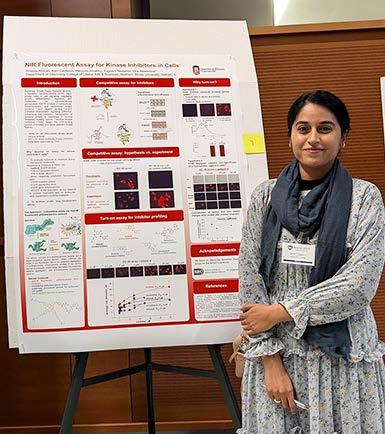
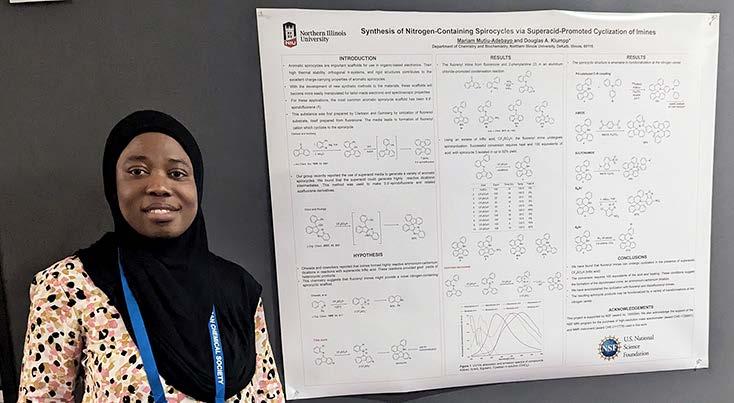
We are proud to announce that Mariam Mutiu-Adebayo, a Ph.D. candidate, represented our institution at the 51st annual National Organization for the Professional Advancement of Black Chemists and Chemical Engineers (NOBCChE) meeting from Sept. 29 to Oct. 4 in Orlando, Florida. This prestigious event brought together professionals, students and leaders in the field to foster networking and promote diversity in the chemical sciences.
She presented her research through a poster titled “Synthesis of Nitrogen-Containing Spirocycles via Superacid-Promoted Cyclizations of Imines.” Under the guidance of Professor Emeritus Doug Klumpp, her work explored innovative synthetic methodologies that hold potential applications in pharmaceuticals and materials science. The synthesis of nitrogen-containing spirocycles is a significant area of interest, as these compounds often exhibit unique biological properties and structural characteristics.
The NOBCChE conference was not only an excellent opportunity for Mutiu-Adebayo to showcase her research but also a chance to connect with fellow chemists and engineers who share her passion for advancing diversity in STEM fields. While attending this meeting, she engaged in discussions that emphasize the importance of inclusion and representation in the scientific community.
Mutiu-Adebayo’s participation in the conference reflects our department’s commitment to fostering talent and promoting the professional development of our students. We encourage everyone to support her as she takes this significant step in her academic journey.
This past summer, graduate student Parisa Enayati interned with the Seattle Structural Genomics Center for Infectious Disease (SSGCID) at the University of Kansas, where she worked in the Protein Structure and X-Ray Crystallography Laboratory under the guidance of Professor Scott Lovell. The Protein Structure and X-Ray Crystallography Laboratory at the University of Kansas is part of the SSGCID.
Professor Lovell’s team collaborates with Professors Timothy Hagen from NIU and Professor Damian Krysan from the University of Iowa on an innovative, NIH-funded project to discover and optimize antifungal acetyl CoA synthetase inhibitors. During her internship, Enayati gained valuable experience in protein purification and crystal structure determination, enhancing her skills and contributing to significant research in medicinal chemistry and biochemistry. Enyati shared more about her experience. “I am thrilled to share with you some insights from my recent summer internship at the Del Shankel Structural Biology Center at Kansas University,” Enyati said.
Throughout her internship, Enyati had the opportunity to engage in critical work on the crystallization and structural modeling of several proteins, notably the Human Prostaglandin Reductase 1. She successfully crystallized and modeled the structure of five different proteins, with the Human Prostaglandin Reductase 1 awaiting publication in the Protein Data Bank. This represents a significant highlight of her work over the summer.
“I am profoundly grateful for the continuous support of my PI, Professor Timothy Hagen,” Enyati said. “His guidance has been invaluable, providing me with the opportunity to grow my knowledge of protein structures as targets in drug development. This experience has been particularly beneficial for my Ph.D. research, allowing me to apply what I have learned in a practical setting.”
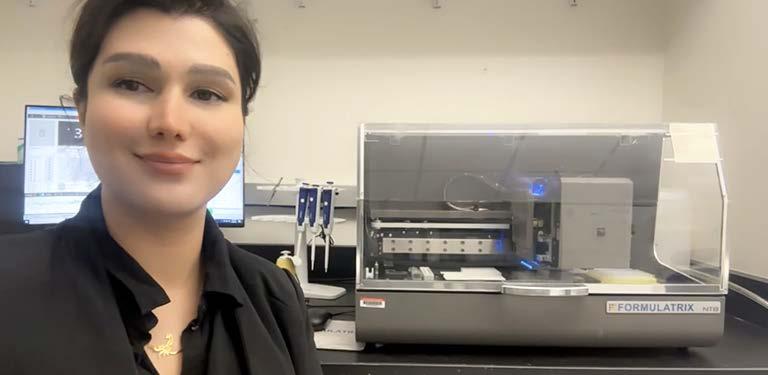
Preparing Proteins with the NT8 Robot: Featured in this photo is the NT8 robot, a pivotal tool that, after purifying and preparing protein, automates protein crystallization trials. It plays a crucial role in Del Shankel lab, enabling us to efficiently determine the optimal conditions for crystal growth. Working with the NT8 robot has deepened Enayati’s understanding of setting various conditions for each protein, enhancing her practical skills in biotechnological applications.
Calvin Soldan

Hometown: Troy, Michigan.
Year:
Graduating senior, May 2025.
Major: Chemistry.
What scholarships did you receive and why did you receive them? How has the financial support impacted your experience at NIU?
I received a merit scholarship and two Department of Chemistry and Biochemistry awards: an undergraduate scholarship and the NIU Chemistry Club Edwin Hyland Memorial Fund. The financial support has made it possible for me to attend university with more time to study and be a student. It has also allowed me to complete research projects by not having to work.
What is your major (and/or minor) and why did you decide on this course of study?
My major is chemistry with a biochemistry emphasis, and my minor is biology. I decided on these fields because they match my interest in the human body and processes that occur inside organisms.
Tell us about the research you are doing and why it interests you.
The research I have done has focused on the creation of fungal drugs that inhibit a fungal virus. The research is in the fields of medicinal and organic chemistry. It interests me because I want to help save people by creating new medicines that either amplify the effects of other medicines or cure people in completely different ways.
How has conducting research strengthened your education and experience at NIU?
I have learned more about the way chemistry is done in a research lab, as opposed to chemistry done at the industrial level. I have also strengthened my skills and received an internship because of it.
How will your research experience help you in the future?
Through my knowledge of certain topics, I am more prepared to attend graduate school and work at a pharmaceutical company due to my critical-thinking skills and hands-on experiences.
Who at NIU has been important to your success doing research and why?
Professor Timothy Hagen, Professor Tao Xu, Drashtibahen Daraji, Lee Sunderlin and many TAs have been helpful. They have guided me with advice about graduate school and industrial jobs, as well as with problem-solving and technical questions about laboratory issues.
Are you involved in any student organizations, mentoring programs or extracurricular activities? If so, which ones? How have they added to your experience as a Huskie?
I am involved in Chemistry Club and University Honors, and I was involved in rugby. Each club I’ve joined has allowed me to meet new people in completely different situations, helping me see the complexity of society.
What Honors program opportunities or support have helped you get closer to your academic or career goals so far?
I was able to job shadow at a hospital and learn more about laboratory sciences as a result.
Who has been one of your favorite instructors/professors and why? What course did they teach?
Timothy Hagen, who taught organic chemistry. He inspired me to pursue a path in medicinal chemistry by the way he taught his class and simplified the subject through individual steps.
Please tell us about your job and hobbies. I am currently an intern at the Fox River Water Reclamation District (FRWRD) learning about analytical chemistry.
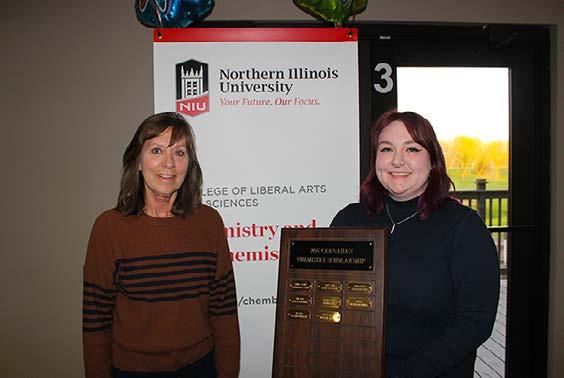
Rock River ACS Introductory Chemistry Award
Nick Savenok
Jocelyn Kuntz
Mia Lulinski
Freshman Chemistry Achievement Award Honorable Mention
Aaron Acosta
Kara Bellanger
Riley Bouchard
Lydia Delk
Lilli Garncarz
Arash Pashaeimofrad
Jordan Ponce
Jenna Roers
Amy Stineman
Aaron Tierney
Freshman Chemistry Achievement Award
Jovani Castillo
Outstanding Sophomore Award
Eric Riley
Undergraduate ACS Award in Physical Chemistry
Joseph Ott
Undergraduate ACS Award in Analytical Chemistry
Eric Riley
Undergraduate ACS Award in Inorganic Chemistry
Pete Gungel
Undergraduate ACS Award in Organic Chemistry
Joseph Ott
Rena Gonzalez
Undergraduate ACS Award in Biochemistry
Pete Gungel
Department of Chemistry and Biochemistry Scholarship Fund
Calvin Soldan
Chemistry Alumni Undergraduate Endowed Scholarship
Mollie Harr
American Institute of Chemists Award
Pete Gungel
Outstanding Senior Award
Jacob Bojan
Rock River ACS Outstanding Undergraduate Research Award
Emily Camposeo
NIU Chem Club Outstanding Undergraduate Research Award
Pete Gungel
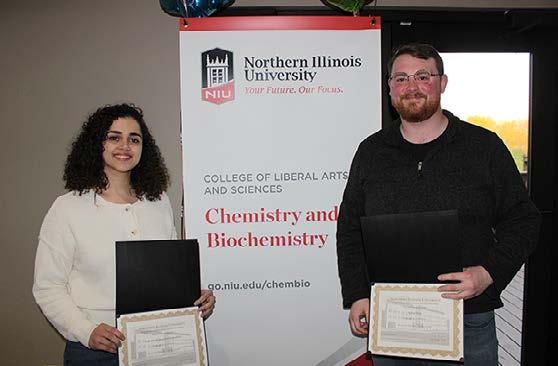
Zydowsky Research Fund
Eric Riley
Emmanuel Naumann
Swanson Undergraduate Research Fund
Allison Stewart
Van Acker-Duminy-Kovarik Endowed Scholarship
Ri Harris
Rosalie Reynolds Endowed Memorial Scholarship
Ri Harris
College of Liberal Arts & Sciences Dean’s Award
Pete Gungel
Edwin Hyland Memorial Scholarship in Chemistry
Emily Camposeo
NIU Chem Club Endowed Edwards-Hyland Award
Calvin Soldan
Jon Carnahan Chemistry Scholarship
Mollie Harr
Kevin Cull Memorial Endowed Teaching Awards
Arghavan Mollazadeh-Moghaddam
Jeffrey Ferreira and Robert King
John D. Graham Endowed Scholarship
Mengyuan Li
Dissertation Completion Fellowship
Xingyi Lyu
Outstanding Graduate Student Award
Lingzhe Fang



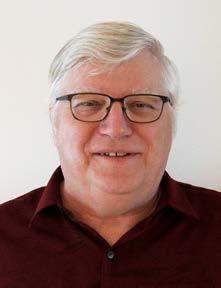
William Mickols, a chemistry alumnus, was one of 150 new members elected to The National Academy of Engineering (NAE).
Election to the National Academy of Engineering is among the highest professional distinctions accorded to an engineer. Academy membership honors those who have made outstanding contributions in at least one of the following categories: “engineering practice, research or education,” “pioneering of new and developing fields of technology, major advancements in traditional fields of engineering, or development/implementation of innovative approaches to engineering education” or “engineering leadership of one or more major endeavors.”
Mickols earned his bachelor’s degree in biological sciences and chemistry in 1977, and his master’s degree in biochemistry in 1978. He serves as president of Mickols Consulting LLC, in Tenino, Washington. He was specifically recognized for the discovery, development and implementation of next-generation desalination membranes and related water filtration systems.
Elected by their peers, NAE members are among the world’s most accomplished engineers from business, academia and government.
In the Northern Illinois University Department of Chemistry and Biochemistry, where academic excellence and groundbreaking research thrive, an intriguing family connection has recently surfaced, illustrating the enduring bonds that link our past to the present.
Professor Christopher Wozny, a distinguished alumnus of our department, earned his Ph.D. in physical chemistry at NIU in 1991. Professor Wozny has had a successful career in academia, and serves as a faculty member at Dalton State College in Georgia. But the legacy of his connection to NIU doesn’t stop there.
His son-in-law, Jeff Ferreira, is currently pursuing his Ph.D. in organic chemistry within our very own Department of Chemistry and Biochemistry. Under the expert guidance of Professor Emeritus Doug Klumpp, Ferreira is navigating the complexities of organic synthesis and pushing the boundaries of chemical research. He graduated with his Ph.D. in December.
The academic link between these two men exemplifies how personal and professional realms can intertwine in the world of science. This not only highlights the personal connection that enriches our department but also underscores the supportive network that extends beyond our walls.
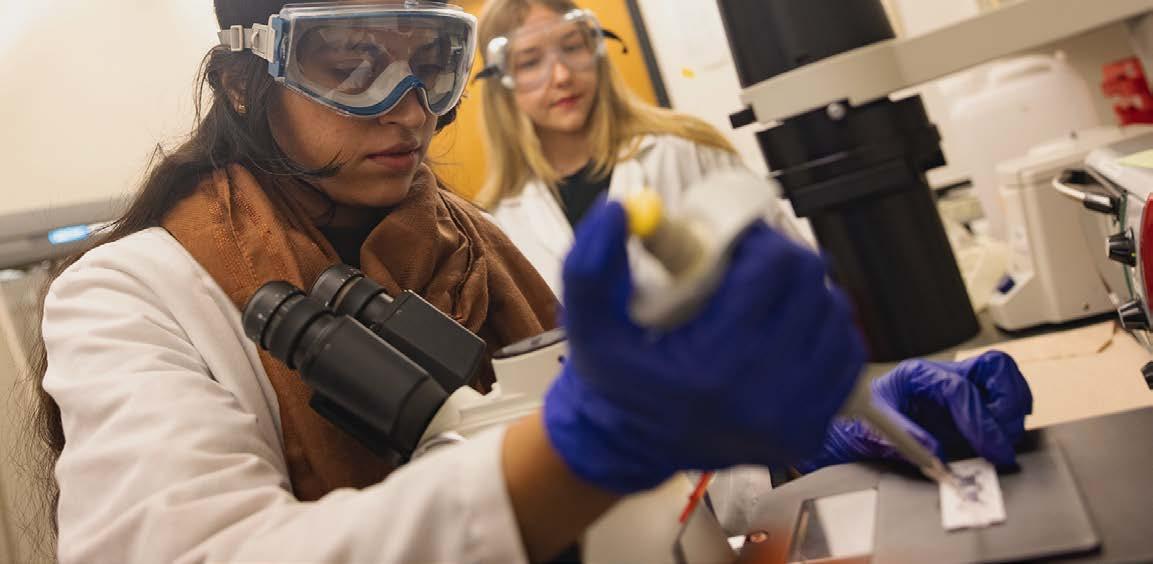
By giving to the Department of Chemistry and Biochemistry, you are investing in future scientists, medical researchers and professionals who will help drive scientific discovery and address our world’s most pressing needs.
There’s a method to fit just about any budget, including annual giving, planned giving and endowments.
For more information, please contact senior director of advancement Laura Knight at 815-753-2390 or laura.knight@niu.edu .
THERE ARE SEVERAL WAYS TO MAKE A GIFT TO THE DEPARTMENT.
online:
Make a credit card gift online (designate your gift to the Department of Chemistry and Biochemistry). You can select from the following funds:
» General contribution in area of greatest need.
» Jon Carnahan Chemistry Scholarship.
» Chemistry Alumni Undergraduate Scholarship (CAUS).
» Chemistry Club Edwards-Hyland Award.
» Department of Chemistry and Biochemistry Scholarship Fund.
» John D. Graham Memorial Scholarship Fund.
» Kevin Cull Memorial Scholarship Fund.
» Rosalie Reynolds Memorial Teaching Scholarship.
» Van Acker-Duminy-Kovarik Scholarship Fund.
online: 1-877-GIV-2-NIU
mail :
One-time credit card payments or check gifts may be made using the Gift Form .